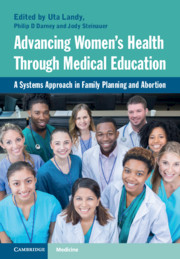 Advancing Women's Health Through Medical Education
Advancing Women's Health Through Medical Education Book contents
- Advancing Women’s Health Through Medical Education
- Reviews
- Advancing Women’s Health Through Medical Education
- Copyright page
- Dedication
- Contents
- Contributors
- Preface
- Acknowledgments
- Introduction
- Section I Abortion Training: Workforce, Leadership, Social & Political Impact
- Section II Integration of Abortion into Graduate Medical Education
- Section III Family Planning Curricular Design & Implementation
- Section IV Reproductive Health Services & Abortion Training: Global Examples
- Chapter 26 Sexual and Reproductive Health (SRH) Workforce
- Chapter 27 Medical Education for Safe Abortion Services in Nepal
- Chapter 28 Abortion Training and Integration in Ghana
- Chapter 29 Pre-service Integration of Abortion and Contraception Trainings in Ethiopia
- Chapter 30 Abortion Training and Integration into Clinical Practice in Colombia
- Chapter 31 Medical Education in Sexual and Reproductive Health in Uruguay
- Chapter 32 Abortion Training and Integration of Legal Services in the Public Health System of Mexico City
- Chapter 33 Abortion Training Models in Sweden
- Chapter 34 Abortion Training and Integration in the United Kingdom
- Chapter 35 Abortion Training and Integration in Ireland
- Index
- References
Chapter 31 - Medical Education in Sexual and Reproductive Health in Uruguay
from Section IV - Reproductive Health Services & Abortion Training: Global Examples
Published online by Cambridge University Press: 30 July 2021
- Advancing Women’s Health Through Medical Education
- Reviews
- Advancing Women’s Health Through Medical Education
- Copyright page
- Dedication
- Contents
- Contributors
- Preface
- Acknowledgments
- Introduction
- Section I Abortion Training: Workforce, Leadership, Social & Political Impact
- Section II Integration of Abortion into Graduate Medical Education
- Section III Family Planning Curricular Design & Implementation
- Section IV Reproductive Health Services & Abortion Training: Global Examples
- Chapter 26 Sexual and Reproductive Health (SRH) Workforce
- Chapter 27 Medical Education for Safe Abortion Services in Nepal
- Chapter 28 Abortion Training and Integration in Ghana
- Chapter 29 Pre-service Integration of Abortion and Contraception Trainings in Ethiopia
- Chapter 30 Abortion Training and Integration into Clinical Practice in Colombia
- Chapter 31 Medical Education in Sexual and Reproductive Health in Uruguay
- Chapter 32 Abortion Training and Integration of Legal Services in the Public Health System of Mexico City
- Chapter 33 Abortion Training Models in Sweden
- Chapter 34 Abortion Training and Integration in the United Kingdom
- Chapter 35 Abortion Training and Integration in Ireland
- Index
- References
Summary
Abortion is legal in Uruguay since 2012. It was preceded by the implementation of a model of risk reduction from unsafe abortion which, based on the values of medical professionalism, laid the foundation for the legal change. To respond to these changes, there is a need to train doctors and residents in gynecology and obstetrics in Sexual and Reproductive Health, both in medical aspects and attitudes, as well as in the current regulatory framework. The development of a university curriculum in Sexual and Reproductive Health (SRH), and the results of its implementation are presented.
Keywords
- Type
- Chapter
- Information
- Advancing Women's Health Through Medical EducationA Systems Approach in Family Planning and Abortion, pp. 309 - 320Publisher: Cambridge University PressPrint publication year: 2021


